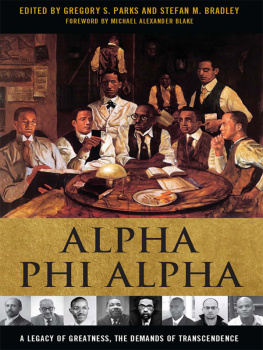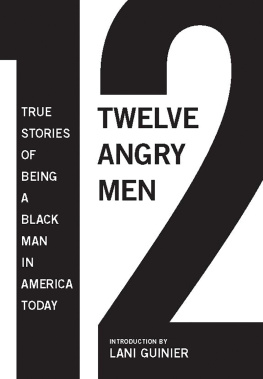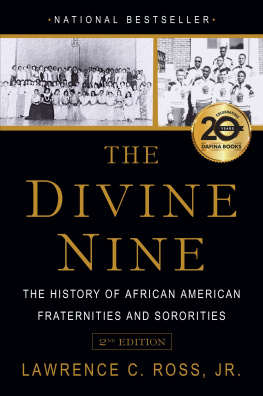Acknowledgments
Of the various books we, the editors of this volume, have written and edited, this one filled us with the most angst. We are both deeply committed to and active in our beloved fraternityAlpha Phi Alpha Fraternity, Inc. As such, on the one hand, we wanted to be accurate and fair and guard the fraternity's actual secrets. Even more, we wanted to do no actual harm to the fraternity. On the other hand, we wanted this book to push beyond the bounds of what would be safe to a place where the fraternity and our brothers would have to do some soul-searching. In the end, our goal is to make the House of Alpha the best it can be and for it to live up to the high ideals present at its founding.
We are grateful, first and foremost, to our brothers who contributed to this volume, particularly those who stuck it out and saw the process through to its completion. Those brothers are Kelso Anderson, Felix L. Armfield, Y. Sekou Bermiss, Kenneth I. Clarke Sr., Terrence L. Frazier, Jeremy M. Harp, Oscar Holmes IV, Derrick Jenkins, Ralph E. Johnson, Andre M. McKenzie, Michael J. Myers II, Rashawn Ray, Richard J. Reddick, Kevin Walter Spragling, and Robert E. Weems Jr. Many of these brothers traveled at their own expense to do the most thorough research possible, made personal and family sacrifices to do this work, and made significant changes or additions to their chapters at the request of readers or to accommodate the fact that other authors left the project prematurely. Indeed, this was a labor of love for the brothers who contributed to this volume, and we appreciate their balance of passion and objectivity.
Thank you to Crystal Chambers, Marybeth Gasman, Joanna S. Hunter, and Mary Beth Walpole for lending their time and talents, sometimes on last-minute notice and under considerable pressure, to this project. Their unbiased insights made this book that much stronger.
To our research assistantsPaul Derohannesian, Soror Brittany-Rae Gregory, Kattie M. Smith, and Brother Dorsey Spencerwe owe a huge debt of gratitude. So much of their effort went into this book and helped make it the work it is.
To Brother Willard Hall, a towering figure in the history of the fraternity, thank you for the insights and materials. His insights helped reduce much of the angst we felt in the latter stages of this book. And a lot of this work could not have been completed if Brother William D. Lyle had not graciously given the contributing authors access to the public documents of the fraternity.
On a personal note, we would like to thank several people. We are grateful to Brother Malik Simmonds for his early suggestion that although the book might be a bitter pill for Alphas to swallow, if the fraternity can embrace what the book reveals, Alpha will be much better in the long run. Of course, in typical Brother Simmonds fashion, he did note that he hopes we do not intend to run for national office within the fraternity anytime soon. We would also like to thank Brothers Keener A. Tippin Sr. and John Hope Franklin, who have passed into the Omega chapter, for inspiring us and modeling the true spirit of brotherhood. Thank you also to our families and friends, who may not be members of the fraternity but understand our mission.
We thank the good people at the University Press of Kentucky for their continued support of research on black Greek-letter organizations (BGLOs). Publishing yet another book on the topic was a risk, and we appreciate their faith in us. To our acquisitions editor, Anne Dean Watkins, we appreciate her dedication and expeditiousness when it came to this project. To Steve Wrinn, director of the Press, we appreciate his willingness to take a chance on this book. To all the other staff, we are grateful for their hard work and dedication in bringing this project to fruition.
Finally, thank you to the readers. We especially appreciate our Alpha brothers who will pick this book up, read it, analyze it on its own merits, and use it to make the fraternity better. We realize that any critique of something one holds dear may be challenging. Like Brother Charles H. Wesley once noted, it took a small group of thinkers to ultimately leaven the whole fraternity; we certainly count our open-minded brothers in that number in the modern context. We also thank those members of other BGLOs who will engage this book and use it to better all our organizations, for they grasp the fact that this book speaks to all our identities and our collective identity and to what it means to be a BGLO or a BGLO member in the twenty-first century.
Appendix A
Alpha Phi Alpha General Secretaries
and Executive Directors
Simeon S. Booker, 1909-1911
Charles H. Garvin, 1911-1912
Joseph R. Fugett, 1912-1913
Henry L. Dickason, 1913-1914
Roscoe W. Ross, 1914-1915
Howard H. Long, 1915-1916
George P. Henton, 1916-1918
Simeon S. Booker, 1918-1919
Numa P. G. Adams, 1919-1920
Norman L. McGhee, 1920-1926
Joseph H. B. Evans, 1926-1946
Burt A. Mayberry, 1946-1948
Bennie D. Brown, 1948-1952
James E. Huger, 1952-1958
Sidney A. Jones, 1958
Lawrence T. Young, 1958-1974
William H. Walker, 1974-1977
James B. Blanton III, 1977-1994
Darryl R. Matthews Sr., 1994-1996
Ralph E. Johnson, 1996-1997
Hebrew L. Dixon III, 1997-1998
Ronald L. Anderson, 1998-2000
Seaton J. White III, 2000
Zollie Stevenson, 2000-2001
Gregory Phillips, 2001-2005
Willard C. Hall Jr., 2005-2009
William Douglas Lyle, 2009-present
Appendix B
Editors in Chief ofThe Sphinx
Raymond W. Cannon, 1914
Lucius L. McGee, 1915
William A. Pollard, 1916
V. D. Johnston, 1917
V. E. Daniel, 1917
Carl J. Murphy, 1918-1922
Oscar C. Brown, 1923-1929
P. Bernard Young Jr., 1930-1933
Arnett G. Lindsay, 1934-1935, 1948
Lewis O. Swingler, 1936-1943, 1946-1947, 1949-1950
Meredith G. Ferguson, 1943-1944
Reid E. Jackson, 1945
W. Barton Beatty Jr., 1951-1961
C. Anderson Davis, 1962-1965
George M. Daniels, 1966-1968
J. Herbert King, 1969-1972, 1973-1974
Laurence T. Young Sr., 1973
Michael J. Price, 1974-1990
Charles F. Robinson III, 1991-1993
John J. Johnson III, 1993-1996
Seaton J. White III, 1997-2000, 2006-2008
John I. Harris III, 2000-2001
William Douglass Lyle, 2001-2006
Rick Blalock, 2009-present
Appendix C
Prominent Alpha Phi Alpha Members
Editors Note: We made every effort to use reliable sources to build and crosscheck this list of prominent Alpha Phi Alpha members. In addition to consulting Alpha's national website, we reviewed written biographies of men alleged to be Alpha members to confirm their membership. The final list was reviewed by several Alpha brothers who are knowledgeable about Alpha's history.
John Hurst Adams: president of Congress of Black Churches
Cannonball Adderley: jazz saxophonist
Orison Rudolph Aggrey: ambassador to Republic of Gambia, Republic of Senegal, and Romania
Na'im Akbar: psychologist
Gerald Albright: American jazz saxophonist
Dave Albritton: 1936 Olympian, high jump; 1980 U.S. Track and Field Hall of Fame inductee
Ron Allen: news correspondent for NBC and ABC
Vinton R. Anderson: ninety-second bishop of African Methodist Episcopal Church; president of World Council of Churches
William T. Andrews: New York State assemblyman
Dennis Archer: justice of Michigan Supreme Court; mayor of Detroit, Michigan; first black president of American Bar Association
Nate Archibald: NBA player; Basketball Hall of Fame inductee
Richard Arrington Jr.: first black mayor of Birmingham, Alabama
Don Barksdale: 1948 Olympian and first African American to play with U.S. Olympic basketball team; first African American consensus All-American college basketball player; NBA player; first African American to play in NBA All-Star game
Next page







